
Lives On Hold: How Gaza's Patients Endure War, Displacement, And Healthcare Collapse
In Gaza, where pain lingers like an uninvited guest, my mother waged a dual battle against cancer and war. While her frail body fought the disease, the war forced her into constant displacement-moving between uninhabitable shelters and relatives' homes in an endless search for safety.
Since her thyroid cancer diagnosis a decade ago, my mother relied on chemotherapy sessions at a specialised cancer treatment hospital. Despite the toll the illness took on her, she persevered with her treatment. Little did she know that battling the disease would be easier than confronting hunger and war. Each time danger loomed, we were compelled to flee our home in haste, leaving everything behind-including the medication she so desperately needed.
She walked with faltering steps, burdened by a body ravaged by illness and a soul weighed down by grief. One hand clutched the scarf draped over her shoulders, while the other held onto mine. The distance to safety was short, yet it felt like an unending journey, with every step seemingly stealing another year from her life.
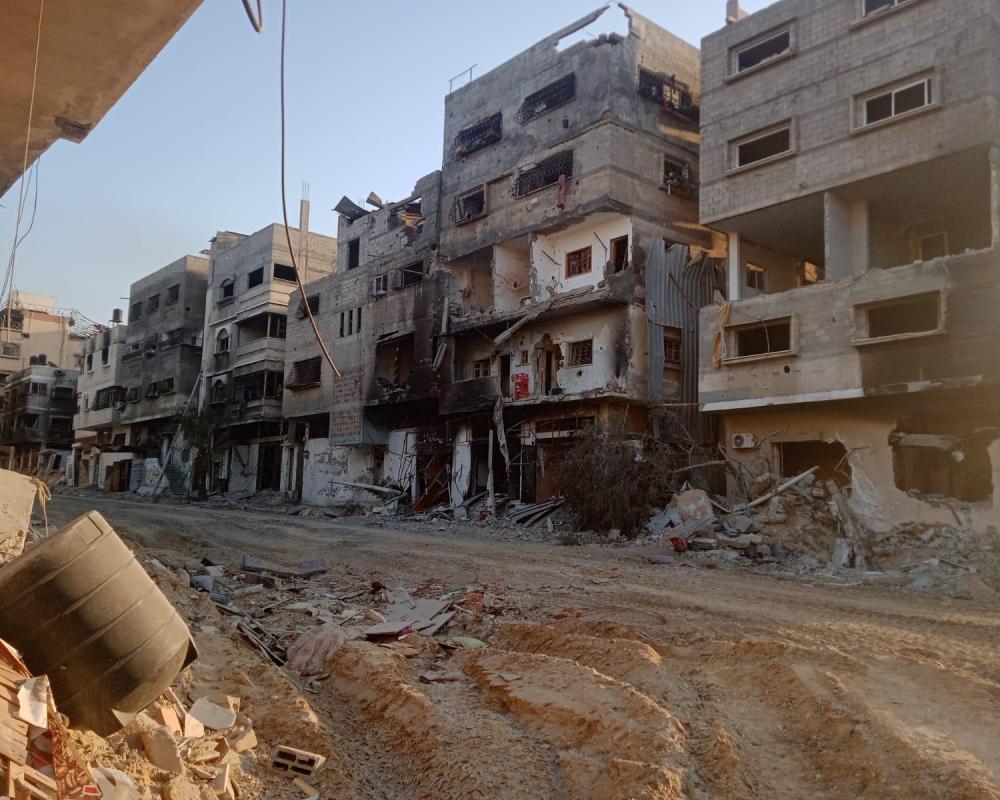
She paused frequently to catch her faint breaths, barely audible over the sounds of shelling and explosions. Each time she stopped, her weary eyes searched the surroundings as if seeking a haven to rest.
A Striking Image of a Bombed Bus for Cancer Patients
My mother recalls those long nights spent in one of the houses we sought refuge in:“The house had been abandoned for years. It lacked even the most basic living essentials-no windows to block the cold, no doors to shield us from prying eyes, and a cement floor so unforgiving that even sitting was unbearable, let alone sleeping,” she said, her voice tinged with sorrow.
In winter, the biting cold only exacerbated her suffering. There was no heating, not even a proper mattress. Her frail body trembled beneath a thin blanket as the pain grew more intense with each passing night without treatment.
The shortage of medicines and power outages caused by Israeli strikes on all electricity plants were a daily nightmare. Essential cancer medications were often unavailable due to the blockade on Gaza and the occupation's restrictions on their entry. When they were available, their prices were exorbitant.
Chemotherapy sessions were repeatedly interrupted because hospitals lacked the necessary materials or due to prolonged power cuts.
“The bombing and the cold made treatment feel like a luxury I didn't deserve,” my mother recounted, her voice heavy with anguish.“I didn't ask for much-just the medication. War isn't just bombs; it's being denied treatment and watching your body collapse, dying slowly with every passing moment.”
I regularly visit medical centres to try to secure her medication, but my efforts are often in vain. Some treatments require a specialist to prescribe the doses, but neither the doctors nor the medications are readily available.
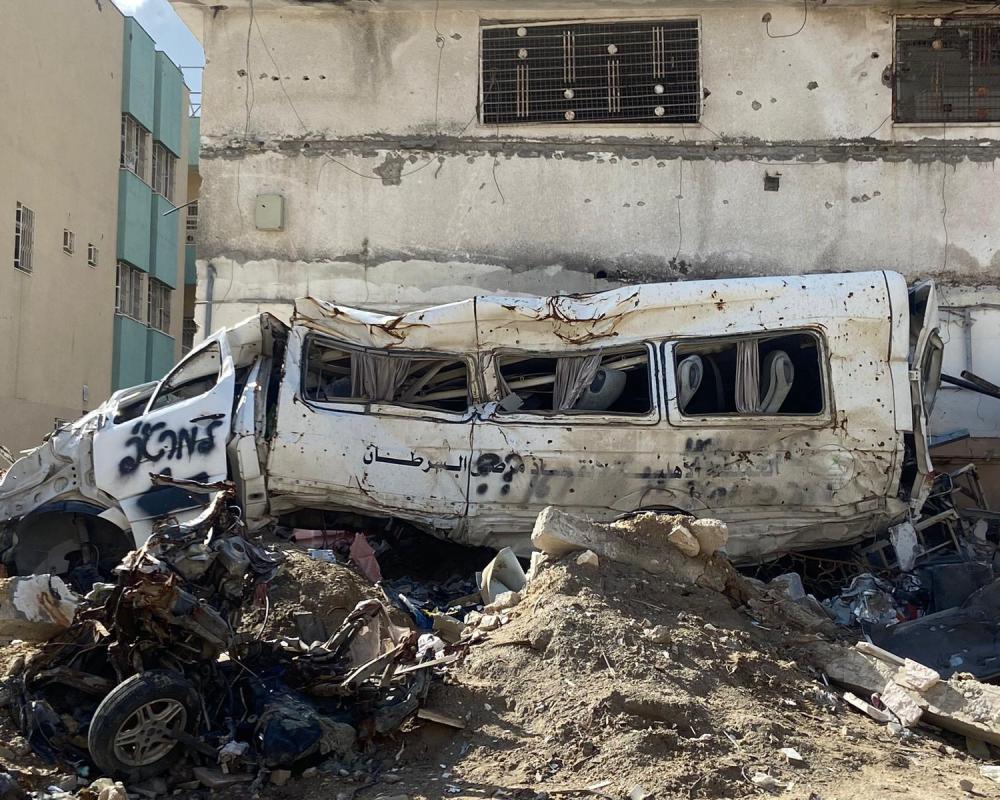
My repeated attempts to secure treatment for my mother ended in failure. I searched through every pharmacy and hospital, but the medications were either out of stock or unavailable. When they were available, they were sold at prices far beyond our means.
This was not just a physical burden; the psychological pressure of displacement, loss, and the constant fear of shelling worsened her condition. Every day, she would ask me,“Will I ever live to see a day when this pain ends?”
My mother's suffering is not an exception-it is a reflection of what hundreds of patients in Gaza endure.
According to reports from the Palestinian Ministry of Health, over 60% of cancer medications are unavailable in Gaza's hospitals. The Israeli army's bombardment of numerous healthcare facilities has made access to treatment an almost impossible task. Even the bus that once transported patients from distant areas to the cancer hospital was targeted and destroyed by Israeli airstrikes.
This is not just my mother's story; it is the story of countless patients in Gaza.
The Struggles of Waiting for Treatment
In a long queue outside a dilapidated medical centre, the walls, covered in dust and scarred by shrapnel, bear silent witness to the suffering inside. Patients exchange weary glances. Some lean against the crumbling walls, while others sit on the floor, exhausted from the wait. Children cling to their mothers, elderly men struggle to stand, and mothers hide their tears. The scene is more than just a queue; it is a poignant tableau of broken hopes.
Among the crowd stands Umm Mazen, a woman in her sixties, her face etched with the fatigue of a lifetime of struggle. Her eyes, filled with pain and patience, tell a story of resilience against illness and hardship.
Umm Mazen is not merely a patient waiting for her turn; she is battling a severe heart condition amid the dire circumstances imposed by war.
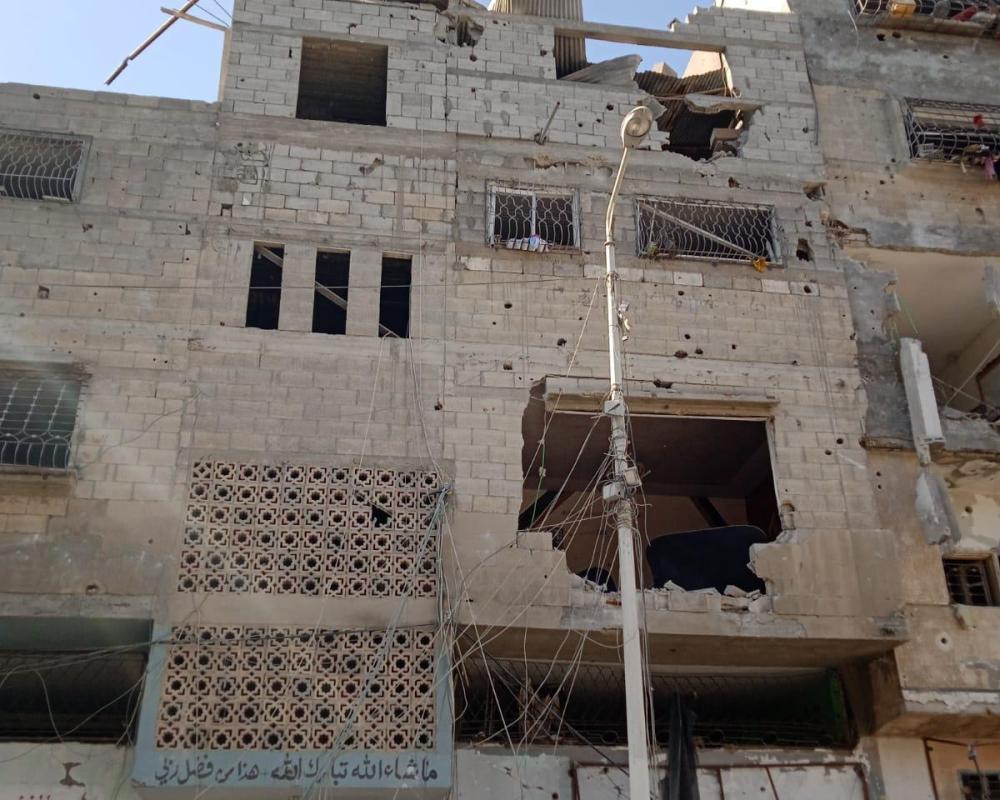
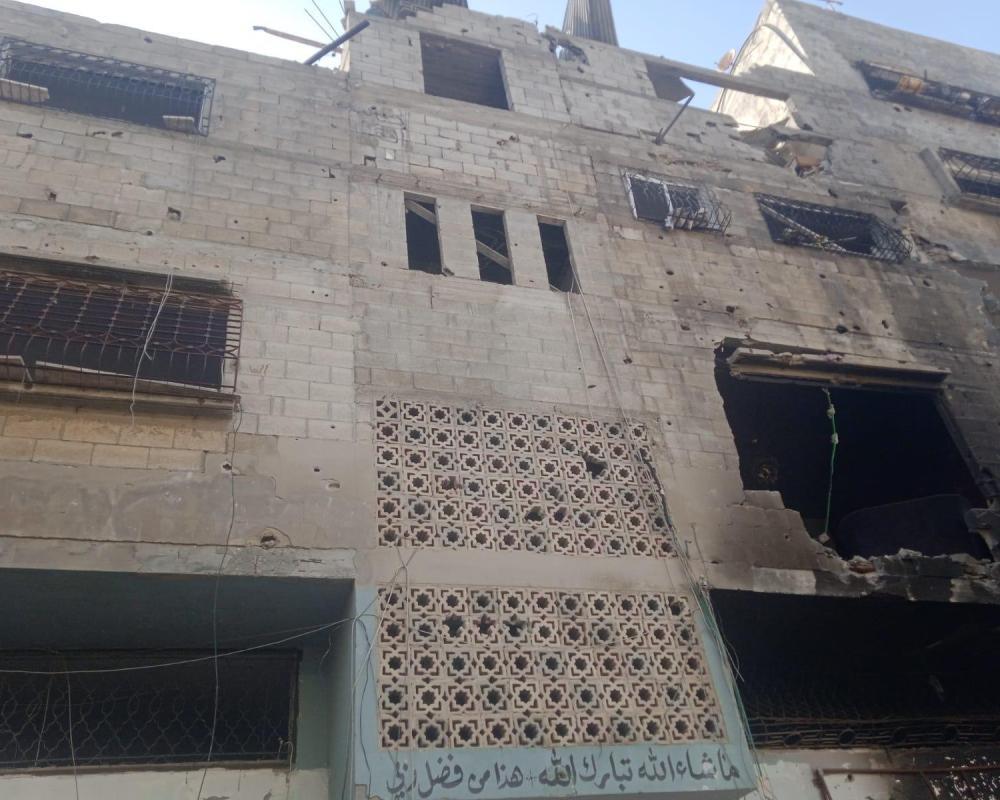
“I stand here under the scorching sun or in the biting cold, feeling my body collapse,” she says in a faint, pained voice.“But what's harder than the physical pain is the sense of betrayal-that I can't get the medicine I need to stay alive.”
She continues, her voice heavy with sorrow:“Sometimes I wait for hours to get essential treatment, only to be told the medication isn't available.”
This endless waiting exhausts her, both physically and emotionally, leaving her feeling vulnerable and insecure about her health.
The Dual Burden of Illness and War
In another corner of this grim reality, 42-year-old Rana, a mother of three, endures the double agony of disease and life under war. She lives in a small house with a tin roof, damaged by shelling and unable to shield her family from the cold or rain. Inside, the home is dimly lit by a small battery-powered lamp due to constant power outages. A tiny makeshift kitchen and sparse furnishings reflect the harshness of her life.
With a pale and frail face, Rana sits silently, carrying the weight of both her illness and the war around her.
“I was diagnosed with colon cancer three years ago,” she explains.“When they told me, I couldn't believe it. My first thought was about my children-who would take care of them? How would I tell them? How would I survive, knowing that treatment here is nearly impossible?”
Before the war, Rana relied on regular check-ups with a specialist, which gave her some peace of mind. Now, with the war raging, she cannot access the medical care she needs.
“I need regular tests and specialised treatment,” she says.“But in Gaza, that's just not possible. Sometimes it feels like I'm fighting this battle alone.”
Standing in line for hours at medical centres, she feels faint and weak.“In the end, they tell me the doctor isn't available or the medication has run out,” she says.“Imagine standing there knowing that every minute of delay brings you closer to the end.”
A Health System on the Brink of Collapse
Around 350,000 patients with chronic illnesses in Gaza are deprived of essential healthcare. The shortage of basic medicines and medical supplies severely limits the provision of even the most minimal health services.
The Turkish-Palestinian Friendship Hospital-the only specialised cancer treatment centre in Gaza-has been closed due to the war, further worsening the crisis.
Dr. Abdul Aziz Abu Samra, a cardiologist at the Palestinian Red Crescent Society in Gaza, describes the catastrophic state of healthcare in the region.
“The healthcare situation in Gaza is dire and worsens daily due to the war,” he says.“The lack of essential medicines and medical equipment has become a daily reality, preventing us from providing care even for critical cases that cannot afford delays..
He explains that cancer patients require regular care, including chemotherapy sessions, which are available only at a single clinic in northern Gaza for emergencies and not consistently.
These patients need specialised medicines and routine tests to monitor their condition, but these essentials are frequently unavailable due to the war, a lack of specialised medical staff, and Israel's blockade on essential supplies,” Dr. Abdul Aziz says.“This leads to a rapid deterioration in their health, often resulting in death.”
He adds,“Patients with other chronic illnesses, such as heart disease and diabetes, also require consistent medical care and medications. Yet, they face long queues and often leave with nothing because the treatments are unavailable. Heart patients, in particular, face significant risks if they cannot access their medication regularly.”
Describing hospital conditions, Dr. Abdul Aziz says:“Most facilities are operating below capacity due to fuel and electricity shortages and a lack of medical supplies. Complex medical equipment like echocardiograms and cancer treatment devices are often unavailable or damaged due to deliberate Israeli attacks on hospitals.”
He concludes,“What pains us most as doctors is not just the lack of resources, but the suffering of our patients-their desperate looks clinging to us for salvation. We lose lives every minute that could have been saved if not for this deliberate paralysis of Gaza's healthcare system by the Israeli occupation.”
This report was produced as part of a journalism assignment for independent female journalists in Gaza Implemented by
Wan ifra.
Legal Disclaimer:
MENAFN provides the
information “as is” without warranty of any kind. We do not accept
any responsibility or liability for the accuracy, content, images,
videos, licenses, completeness, legality, or reliability of the information
contained in this article. If you have any complaints or copyright
issues related to this article, kindly contact the provider above.

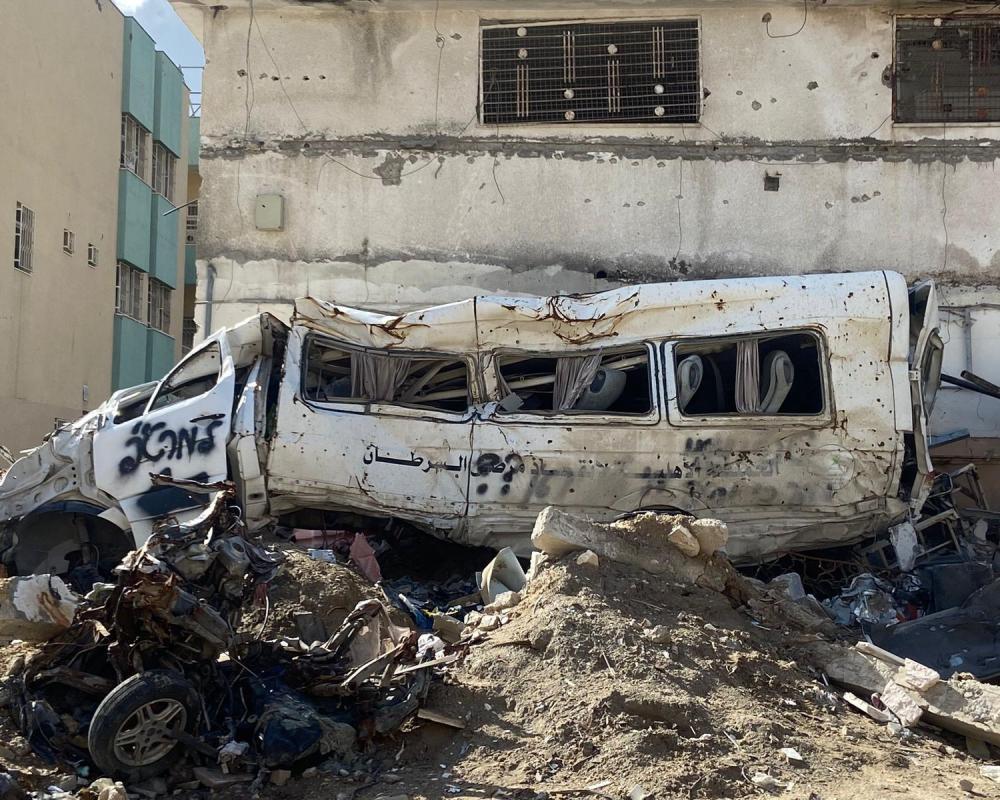















Comments
No comment